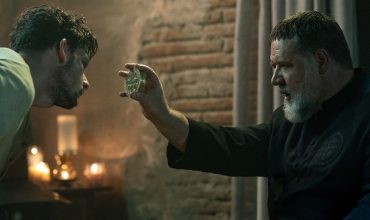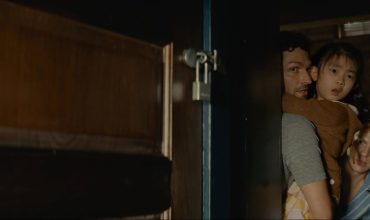COMING HOME IN THE DARK is the first feature length film from emerging director James Ashcroft. It’s mostly based on a short story by Owen Marshall. The film is deeply set in New Zealand. From the landscape to the accents, there’s a real feeling of location throughout.
The film tells the story of a family on a road trip through beautiful New Zealand. Hoagie (Erik Thomson) and Jill (Miriama McDowell) drive through the wilderness with their twin teenage sons. The sons are delightfully uninterested in the glorious views. It’s sweet and endearing.
The opening of COMING HOME IN THE DARK is excellent. The New Zealand rivers and mountains are breath-taking, and beautifully captured. Ashcroft and his team have a lot of skill when it comes to camera work.
What’s particularly impressive is the camera work after the ‘Big Bad Thing’ happens. After that, COMING HOME IN THE DARK happens… well, in the dark. Filming at night is especially difficult, so Ashcroft and everyone involved should feel very pleased with themselves.
‘The Big Bad Thing’ comes in the form of two scruffy wanderers who interrupt the family picnic. Mandrake (David Gillies) is a talkative bastard. A truly sadistic person, who doesn’t shut up. And quite creative in his cruelty.
It’s a bit of a pity he talks so much. It’s hardly Gillies fault, but he’s a very charismatic actor. So Mandrake dominates most of the scenes he’s in. With him talking so much, there’s less space and time for the other characters to be fleshed out.
The other scruffy wanderer is Tubs, played by Matthias Luafutu. He says almost nothing throughout the entire film. But his silence and stillness is palpably threatening. Tubs mostly does what Mandrake tells him to do. But he’s also smarter and far more dangerous than people realise.
The ‘Big Bad Thing’ happens. Lives are changed forever. And the family is taken hostage. There seems to be some bad blood between Hoagie and his captors. There’s a past to be revealed where maybe this mild-mannered father isn’t as decent as he seems.
This is when COMING HOME IN THE DARK gets deep. Not content with being a regular violent film, it wants to grapple with a hidden part of Hoagie’s dark past. A hidden part of New Zealand’s dark past.
It asks the question: what’s the difference, if any exists, between doing something, and letting that something happen? What’s the difference between being the perpetrator, and being a bystander?
It’s a hyper violent revenge film. So there’s plenty of opportunities to explore that dilemma.
At first, the violence of COMING HOME IN THE DARK is really shocking, and well timed. The ‘Big Bad Thing’ was such a surprise, it made me shriek.
But it’s hard to maintain that sort of tension for a full length film. It’s really difficult to up the stakes enough to keep an audience interested, without the violence becoming over-the-top and slightly comic. One of our audience members started giggling. Another started yelling, ‘As if!’
I think COMING HOME IN THE DARK is a film that a lot of people will really enjoy. It’s like a home invasion thriller, and a ticking-clock hostage drama, and a little dark history lesson, all in one.
And I think James Ashcroft and his team have the talent to make some brilliant films in the future.
But this film was just a little bit overwrought for me.
Rating: 6/10


